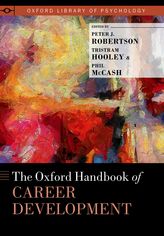Research in career development not only builds on theoretical approaches for evidence-based practice and interventions, but deepens our understanding of how career development has the potential to make the world a better place. The Oxford Handbook of Career Development is a compilation of research, with 25 chapters devoted to different aspects of career development. The interdisciplinary nature of our field was captured nicely through the broad range of topics addressed.
The editors’ intent was to broaden their global reach from a book they had published well over a decade before, comprising knowledge-sharing by researchers from around the world. Although the majority of the researchers and authors are from the United Kingdom, there are career development topics addressed from authors around the world, representing a mix of societal and cultural perspectives. The editors clearly articulate their journey of the book’s evolution in a well-written preface and opening chapter on Rethinking Career Development. This includes the acknowledgement that terminology challenges continue to exist in the field, the intended meaning used by the authors, as well as a brief account of the origins of career development. This creates a foundational starting-point for readers, and improves flow and readability, as the intended message can be attended to without semantic distraction.

The book is divided into three sections: Contexts, Theory and Practice. The Contexts section addresses how careers are shaped by our environments, and the chapters are devoted to exploring implications for career development on the changing nature of work, Human Capital Theory, taxonomies that link educators and employers, education for meaningful work, career guidance and frameworks for public policy.
The second section is on theory and concepts affecting the field. It includes research on integrated analysis of Career Development Theory, Organizational Career Development Theory, social justice, Cultural Learning Theory and cross-cultural career psychology.
The final section is on career development practice including topics on supports and actions to help individuals and groups with their career development, professionalization of the field, transformative career education, labour market information, the role of digital technology and factors contributing to effective career counselling.
The themes of vocational guidance, career theories and impacts on everyday practice and policy-making were threaded throughout the book. I also noted several additional themes that were both reassuring and familiar to the work I do in direct client supports and academia. These included the foundational understanding that career happens across the lifespan and includes paid and unpaid work, learning and leisure activities.
Another theme that I connected with, and is generally one that we continue to grapple with in Canada, is that we do not have complete clarity about our identity as a professional practice. I think it is fair to say that the field of career development has been on a continual journey of determining how it fits in, and how it is separate from, other fields including psychology, education, human resource management and organizational behaviour, to name a few. The interdisciplinary reality of career development is both one of its greatest strengths and potentially most difficult challenge to overcome: if you fit in everywhere, then how do you stand out?
Several chapters in the book address the good works that are creating momentum to carry the field forward, yet also address how the political nature of career development, the difficulty in providing quantifiable data on the benefits of career interventions, the changing nature of work and the cross-disciplinary nature of the profession continue to create interesting challenges.
This research anthology proved to be both thought-provoking and digestible, and the efficacy of the research methods is clearly presented. Given the academic nature of the research included, I was expecting a fair amount of skimming to get through the book. However, the majority of the articles flowed well and used familiar professional lingo, providing a surprisingly easy and enjoyable read. The authors have written with an average career professional in mind, yet fellow researchers and academics will find enough thought-provoking depth to prompt further inquisition and exploration of referencing material. The authors encourage connections to everyday practice, while raising awareness of the complexities faced within career development services and policy-making.
The book whole-heartedly tackles recently emerged topics in cultural sensitization, narrative counselling, career education and client-centred counselling. However, while access to services, race, ethnicity and social class are included, there is little presented on disability, universal design, gender or LGBTQ2+ topics, which are all trending issues in Canada.
That said, one book cannot possibly cover it all, and with the number of topics covered by researchers from around the globe, The Oxford Handbook of Career Development is a successful contribution to the field of career development. It not only captures the interdisciplinary nature of career development work, but deepens our understanding of the cross-threaded complexities that affect policy, theoretical approaches and career helping services throughout the career lifespan.




